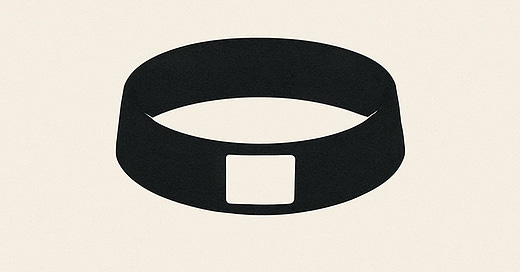Worship Without Sacrifice—and 6 Other Sins the Church Keeps Blessing
They were named in 1925. We baptized them in red, white, and blue.
At the time of writing, the One Big Beautiful Bill had just been signed into law.
Instead of trying to summarize my rage/sadness/confusion, here’s something Pastor Zach Lambert said that hit me square in the gut:
While lamenting, a memory of something I posted four years ago popped up on the TimeHop app: the Seven Social Sins.
What Are the Seven Social Sins?
That’s a great question, I’d love to tell you.
Back in 1925, Canon Frederick Lewis Donaldson stood in the pulpit of Westminster Abbey and named what he called the Seven Social Sins. Gandhi later picked up the list and published it in Young India, calling them “the seven blunders of the world.”
And a hundred years later, they’re still relevant. Still alive. Well-fed. Platformed. Monetized. And in too many cases, canonized by the American Church.
Every single one of the social sins.
Here they are:
1. Politics without Principle
2. Wealth without Work
3. Pleasure without Conscience
4. Knowledge without Character
5. Commerce without Morality
6. Science without Humanity
7. Worship without Sacrifice
These aren’t personal temptations like the “seven deadly sins.” These are social sins. Structural. Cultural. They shape what we normalize, fund, repost, preach, and tolerate.
And if you’ve been wondering why so much of American Christianity feels hollow, cruel, or just plain off— well, pull up a chair.
Let’s take a journey through them. I shall be your Tour Guide on this Wonderful Ride through Hell on Earth…ish.
1. Politics Without Principle
This isn’t about voting blue or red (or a third party or abstaining from voting because you didn’t like either candidate—coughcoughlamecopoutcoughcough).
This is about what happens when the Church trades its prophetic voice for a seat at the table of power. When “Christian” gets fused with nationalism, racism, and authoritarianism, the gospel stops being good news for the poor and starts looking like a brand for the powerful.
It’s quoting Jesus to justify cruelty.
It’s “thoughts and prayers” without policy or compassion.
It’s “Biblical values” that somehow always align with preserving the status quo.
It’s not principled. It’s performance.
And it’s been blessed in pulpits that no longer smell like Christ—but like campaign rallies.
2. Wealth Without Work
This is the lie that blessing looks like a bank account. That if you’re rich, God must be pleased with you.
It’s why prosperity preachers fly private while volunteers burn out.
Why some churches have multi-million-dollar endowments but can’t pay their nursery workers a living wage.
It’s why folks still quote “God helps those who help themselves” like it’s Scripture (spoiler: it’s not).
It’s wealth hoarded, inherited, or manipulated—divorced from labor, ethics, and community.
It’s exploitation in a three-piece suit, wrapped in a Bible verse.
3. Pleasure Without Conscience
Nobody is against joy. And nobody is against your happiness. But.
This sin isn’t about delight—it’s about numbness.
It’s comfort that ignores suffering.
It’s using freedom as an excuse to check out, distract, or justify cruelty.
It’s the church that cries out against drag brunches but shrugs at children in cages.
It’s modesty sermons that never mention abuse.
It’s addiction to dopamine and denial all-the-while calling it “God’s favor.”
If your faith protects your comfort more than your neighbor, you might be worshiping pleasure, not Jesus. (And not the “I feel God’s pleasure when I run” Jesus but the my-pleasure-is-my-god-that-I-pretend-is-Jesus Jesus.)
4. Knowledge Without Character
You can have all the degrees and still miss the point.
Knowledge without character is when theology becomes a weapon.
When “being right” becomes more important than being good.
When we confuse intellectual sharpness for spiritual depth.
It’s the pastor who can parse Greek but doesn’t know how to apologize.
It’s Christian Twitter threads that are theologically airtight and compassionately bankrupt.
Here’s the thing: we’re not AI. We can say “I don’t know.” And sometimes, that’s the most faithful response.
5. Commerce Without Morality
The gospel is not a product. The Church is not a brand.
And Jesus is not for sale. But you wouldn’t know that from the conferences, merch drops, VIP prayer packages, and $900 “revival weekends” flooding the algorithm.
It’s pastors building platforms and calling it evangelism.
It’s worship teams with stylists but no formation.
If Jesus flipped tables for turning faith into commerce, what would he do now?
6. Science Without Humanity
We saw it when our world shut down during the pandemic: whole congregations treating public health like persecution.
We see it in how the church often ignores climate science, mental health, and *any* data that challenges its comfort zone.
Science without humanity is progress without compassion.
It’s innovation that serves profit but not people.
It’s calling yourself pro-life while rejecting everything that helps someone live.
Jesus didn’t fear healing—he embodied it.
And he’d probably love a good vaccine rollout.
7. Worship Without Sacrifice
This is the keystone sin, the one that makes all the others possible.
Because if your worship doesn’t cost you anything, then it’s not really worship. It’s spiritual entertainment.
Worship without sacrifice is the Sunday show that asks nothing of your Monday life.
It’s singing “Here I am, Lord” while ignoring every call to change.
It’s vibe over virtue, mood over mission, aesthetics over ethics.
If your worship doesn’t lead you to love, give, repent, or serve—then it might be worship in name only.
So What Now?
These aren’t just problems. They’re patterns.
They are what happens when the Church forgets it’s supposed to look like Jesus—and starts trying to look impressive, influential, or in control.
But here’s the good news:
We are not powerless.
And we don’t resist these sins alone.
We resist them together.
So here’s how we push back.
Together. As Church. As Body.
As salt and light in a world that desperately needs flavor and fire.
1. We resist politics without principle by choosing formation over partisanship.
We don’t need to be neutral. But we do need to be faithful.
We preach truth even when it’s unpopular.
We disciple people to form their conscience—not outsource it to a party.
We teach people to follow Jesus, not the algorithm.
Your church doesn’t need to be bipartisan.
It needs to be prophetic.
2. We resist wealth without work by practicing economic justice.
We redistribute. We budget for compassion.
We tithe toward liberation, not luxury.
We pay staff fairly. We question how money is earned and how it’s spent.
We challenge any theology that equates blessing with wealth.
Jesus didn’t die so we could build endowments.
He called us to love our neighbor—and that includes how we spend.
3. We resist pleasure without conscience by cultivating accountable community.
We don’t shame people. We invite them into wholeness.
We ask hard questions:
Does this habit numb me or free me?
Does this pleasure help me love others more?
We build churches where truth can be told and healing can begin.
Conscience isn’t guilt. It’s discernment.
And we need it more than ever.
4. We resist knowledge without character by prioritizing humility over certainty.
We don’t need more hot takes.
We need more repentance.
We don’t need to win arguments.
We need to embody grace.
And again—we’re not AI.
We can say “I don’t know.”
And that might be the most Christlike thing you can say in a polarized world.
Because the Gospel isn’t a debate to win.
It’s a story to live out.
5. We resist commerce without morality by refusing to commodify the gospel.
We give freely what we’ve received.
We stop treating worship like a brand and pastors like influencers.
We ask if our church budgets reflect our values—or just our anxieties.
We put people before platforms.
Mission before metrics.
Service before spectacle.
The Gospel is good news. Not a product launch.
6. We resist science without humanity by honoring healing in every form.
We bless vaccines. We support mental health care. We care about creation.
We embrace science as one of the ways God brings about restoration.
We stop pretending faith and science are enemies. They’re not.
Healing is holy.
And so is the nurse, the therapist, the epidemiologist, and the solar panel installer.
7. We resist worship without sacrifice by letting our liturgy shape our lives.
Worship should cost something.
It should change us.
If your church service never leads to generosity, reconciliation, or justice—then it might just be noise.
Real worship doesn’t just raise hands.
It opens them.
We offer our time.
Our resources.
Our comfort.
Our lives.
Because the cross is not a symbol of status.
It’s an invitation to surrender.
Let’s Be That Church.
Not the loudest.
Not the flashiest.
Not the most well-funded.
The faithful one.
The grounded one.
The one that refuses to play dress-up with injustice and call it “Biblical.”
Because if we don’t resist these sins, we’re not just tolerating them.
We’re participating in them.
But if we do?
If we walk this road together—
If we tell the truth and choose humility—
Then maybe, just maybe, we’ll look a little more like Jesus.
And that…
would actually be good news.





Your words speak to my spirit and my heart. I greive for a loving, compassionate empathetic and spiritful community,ie, the church.
May we all look more like Jesus. May we see the cross more clearly as a place of surrender and not a status symbol we wear around out necks. And may we embody the message that Jesus came to bring, because that would be good news. Amen.